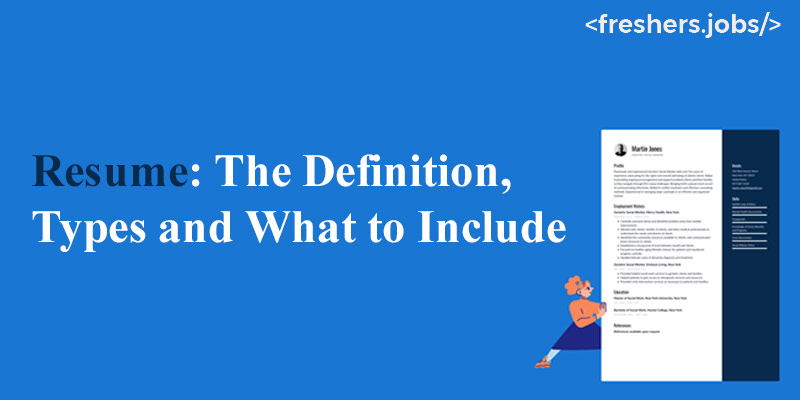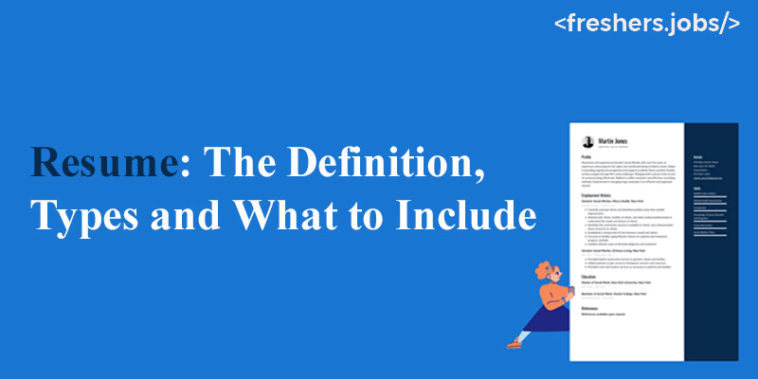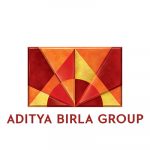A professionally designed resume can help you differentiate yourself from other applicants when applying for freshers jobs. Your opportunity to make an excellent first impression on a recruiter is through your resume, so it’s important to emphasise your proficiency. Thus, you must know what is resume. Understanding the various resume formats will enable you to select the one that best highlights your skills.

One of the documents a company could ask you to include with your application is a resume. Candidates can use their words to describe their experience and skills on a resume. To make your resume as effective as possible, it is helpful to look into information about resumes and discover what to include in one.
In this blog, we will go over what a resume is, why it’s essential, and to whom. We will also cover what to include and the different kinds of information you should have.
Initially, Let us know what is resume for job.
What is a Resume?
A resume is a formal document highlighting a person’s educational background, professional experience, and transferable skills. A resume is written by someone looking for work. The typical methods recruiters or managers use to gather resumes are in person, through a job search engine, a professional social media page, or an organisation’s employment website. Most resumes include a list of best skills, a professional summary, a job history, and education.
The Purpose of a Resume
- What is the purpose of resume ? The goal of a resume is to convince HR managers that you are qualified for a job and deserve an interview.
- Many job applicants mistakenly believe that their resumes need to give a thorough overview of their professional backgrounds.
- Consider your resume as an advertisement for yourself instead.
- Your resume should only highlight your most noteworthy achievements and most pertinent qualifications and skills.
- Hiring managers will pay attention to you and invite you to more interviews if your resume communicates that you can perform the job.
- This allows you to promote yourself to potential companies.
- Give managers a clear understanding of your qualifications by outlining your experience, skills, and education.
- Aids companies in removing unqualified candidates.
- It enables you to show your proficiency in written communication.
Who requires a resume?
Many companies request resumes from candidates before considering them for a job. You will need a resume to give the hiring manager if you are interested in applying for new jobs and would like to interview in person. Employers who request resumes usually state this in their jobs alert. If a resume is optional, they might ask you to complete a print application so that they can learn more about your professional history. Even for jobs that don’t require them, submitting a typed resume to show professionalism is still an excellent idea. Know how to write an ATS friendly resume.
The Different Types of Resumes
Why is resume important ? Depending on your skills, you could find more success with one type of resume over another since different resume formats highlight various aspects of your experience. Five different resume types are listed below:
Chronological Resume
Chronological resumes highlight your professional background, placing your most recent role at the top. The most typical resume structure is a chronological one. This form of resume is beneficial if you have a consistent work history with no gaps in employment. Thus you must know how to explain gaps in employment on your resume.
Functional Resume
What is the use of resume? Instead of listing the jobs you have held, a functional resume highlights the skills you have acquired throughout your work. This resume will benefit those who have occasionally experienced employment gaps but have consistently enhanced their skills. It is also helpful for people who are qualified for a field or profession but need more work experience there.
Combination Resume
The chronological and functional resume styles are combined in the combination resume. This resume gives your work history and your skills equal weightage.
Short Resume
The mini resume will be helpful if you attend a networking gathering or meet with several recruiters. This resume, which recalls a small business card, offers a brief synopsis of your professional history. This resume style is perfect if you want to highlight your skills and previous work experience certificate.
Non Traditional Resume
Consider using a nontraditional resume if you seek a creative position in music, writing, or the fine arts, which are the top careers in arts. What is resume? This kind of resume serves as an example of your artistic talent. Recruiters frequently request samples of your work when hiring for jobs in the arts before deciding whether you are apt for the job role.
In the next section, we shall see what to include in a resume.
What to Include in a Resume?
What does resume contains? To land a decent job, you can include specific categories in your resume for your job application. These categories include:
Header
This important section typically includes your name, contact information, and, occasionally, your present position. You can also include a link to your portfolio if you send your resume online. You must include this header so that managers will have the information they need to contact you.
Summary of a Resume
Candidates introduce themselves to hiring managers in the resume summary part. You can include a few lines in the summary about your personality and why you believe you are suitable for the job. You can also mention your professional aspirations and how your background qualifies you for the job.
The Work Experience
You can highlight your previous professional work history, your job description, and the duration of your job in this part. Regardless of the design you choose to use for your resume, you can structure your job experience category using the reverse-chronological order. Ensure the duties and experiences you list correspond to those in the job description that motivated you to apply for high freshers salary jobs
Include the Skills Section
You can also highlight your technical and soft skills in a part of your resume dedicated to skills. If you ensure the skills relate to the job description, your chances of landing a job may increase, so you must know what is resume for job. They can be soft skills, like effective communication techniques, or soft skills, technical skills, like software programming. This section of your resume can also list any relevant qualifications or certifications.
Include the Education
The period it required you to earn your degree and its name are listed in your resume’s education section. It’s essential to mention the name of the academic institution, whether it’s a university, college, or technical college when you are outlining your educational background. You should consider mentioning the kind of degree you received from each school. Your grade point average (GPA) can also boost the probability that you will be recruited.
List the Hobbies
What is the purpose of resume? If this part is relevant to your desired job, include it in your resume. Make a summary of the voluntary work you have participated in that will help your application. You can also mention your extracurricular activities to show how you develop your skill set outside of the workplace. For example, if you claim on your resume that you have reasonable problem-solving skills, you could mention playing chess as a hobby to show the hiring manager how you hone these skills outside of the workplace.
Optional Categories to include in a good Resume
Here are some optional about including the following optional sections on your resume:
Certifications and Licenses: Some jobs might need you to have additional certificates or licences to be qualified for the position. In this case, it’s best to list the certifications on resume to let a prospective employer know that you meet the requirements and are available for employment.
Languages: what is a job resume? People who understand multiple languages may be preferred for some jobs. If so, mention the language proficiency on your application for employment or include it on your resume.
Awards and Honors: If your job path is connected to your awards and honours, you will appear more qualified and appealing.
Volunteer Work: If it relates to your professional path’s skills and job responsibilities, list volunteer work under the work experience section. If the volunteer work is unrelated, consider adding it at the bottom of your resume, along with a brief but effective description of the group and your responsibilities.
Publications: If the position you seek values this information, and you have published works, you should include it on your resume.
Freelance Work Experience: This qualifies under job experience. Only put relevant freelance experience.
Conclusion
I hope you are clear from the blog about the Resume, its definition, the types, and what must be included in the resume. The main point to remember is what is resume and why a structured resume is. As we say, the First impression is the best. Your resume must be the first impression for employers to snatch you into their organisation. Read these tips and share this article on how best to work on your resume.



